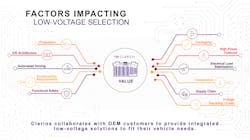MUNICH, Germany—Global battery company Clarios sees low-voltage batteries playing a pivotal role as trucks become more high-tech and focus on idle-off functions.
"Trucks are getting more sophisticated, they need more power when the key is off, and they are going to have to go to at least an AGM (absorbed glass mat)-style battery to be able to support that," Mark Wallace, Clarios president and CEO, said during a press briefing held at the House of Journalists coinciding with the September IAA Mobility show in Munich, Germany.
"Plus, especially in Europe, they want to look at a system of batteries that can invert and run air conditioning, heating, etc. So, you have a total idle-off solution for vehicles that are parked on the side of the highway while drivers are resting. We see that as definitely a growth market not only because it's an area that's underserved but also because you have multiple batteries on board a truck as well."
Clarios executives outlined their vision for how low-voltage batteries can help improve trucking operations' efficiency, safety, and sustainability. The company is a global supplier of advanced, low-voltage architecture and batteries, which it says are in one-third of vehicles globally. Clarios partners with aftermarket and OEM customers to deliver the systems, solutions, and services to support the powertrain transitions underway, according to Wallace. He said the company's sustainability and operational standards recover, recycle, and reuse up to 99% of its battery materials.
See also: Trucking's hydrogen future nears reality overseas
Powering today's and tomorrow's trucks
Wallace noted that low-voltage batteries are used in various trucking applications, including powering auxiliary systems such as HVAC, lighting, and over-the-air updates. However, they believe low-voltage batteries will play an even more significant role in trucking.
Federico Morales-Zimmermann, Clarios group VP and GM for original equipment, explained that low-voltage batteries play an increasingly important role in heavy-duty fleet operations, supporting new vehicle technologies such as electrification, connectivity, and autonomous driving. He also said that fleet operators need to be able to think about low-voltage batteries from a systems level rather than just as individual components. This means understanding how low-voltage batteries interact with other vehicle systems and how they can be used to improve fleet efficiency and uptime.
Morales-Zimmermann and Wallace also noted that with the increased focus on fleet sustainability, low-voltage batteries can help operators reduce their environmental impact through idle-off power that reduces emissions.
See also: Navigating the rapid expansion of truck technology development
The company is also developing new battery recycling technologies that could help reduce the environmental impact of transportation.
Low-voltage batteries also power advanced driver assistance systems, such as collision avoidance and lane departure warning systems. Wallace added that low-voltage batteries have the potential to transform the trucking industry. He sees low-voltage batteries playing a pivotal role in improving trucking operations' efficiency, safety, and sustainability.
Clarios is also working on developing new battery chemistries that are designed explicitly for trucking applications. For example, it is developing a new type of lithium-ion battery designed to be more durable and reliable than traditional flooded batteries.
Furthermore, Clarios is developing new battery management systems that can help optimize the performance of low-voltage batteries in trucking applications. These battery management systems can extend battery life, improve battery efficiency, and reduce the risk battery of failure.







